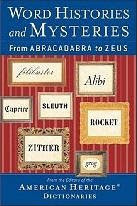 Throughout its history English has absorbed great numbers of words from other languages, often adapting or modifying them in the process. The methods - and sources - by which new words have been acquired are numerous, and a representative sample are displayed in this book. Here you can discover the relationship between caprice and hedgehogs, why vixen is unique, how the current meaning of internecine arose from a mistake made by no less a personage than Samuel Johnson, and the connection between hello and The Simpsons’ Mr Burns.
Throughout its history English has absorbed great numbers of words from other languages, often adapting or modifying them in the process. The methods - and sources - by which new words have been acquired are numerous, and a representative sample are displayed in this book. Here you can discover the relationship between caprice and hedgehogs, why vixen is unique, how the current meaning of internecine arose from a mistake made by no less a personage than Samuel Johnson, and the connection between hello and The Simpsons’ Mr Burns.
I rarely visit the library without strolling through the 420s in the hope of finding books like this. Having a great fondness for the sprawling mass of words that is my only language, I’m always keen to learn more about its history. (If I had any talent for languages other than my own, I might have considered studying linguistics.) The explanations given of how various words have developed or been transformed are easy to follow, and there’s a helpful glossary listing all the technical terms used, with references to examples used in the book. Because the aim was to cover the broadest possible range of routes by which new words have entered the language during its long existence, there’s no real focus on the English of one particular country. There are words from all over the world. And there’s a variety of incidental information to acquire, from ancient mythology related to the names of the days of the week to inventive English hangmen to feudal Japanese culture. History and words - two of my favourite things!
What I would love to know more about now is how linguists go about reconstructing long-dead languages such as Proto-Indo-European from words in descended tongues. I need another book....
Rating: A

















This sounds interesting. I will have to keep my eyes open for it!
ReplyDelete